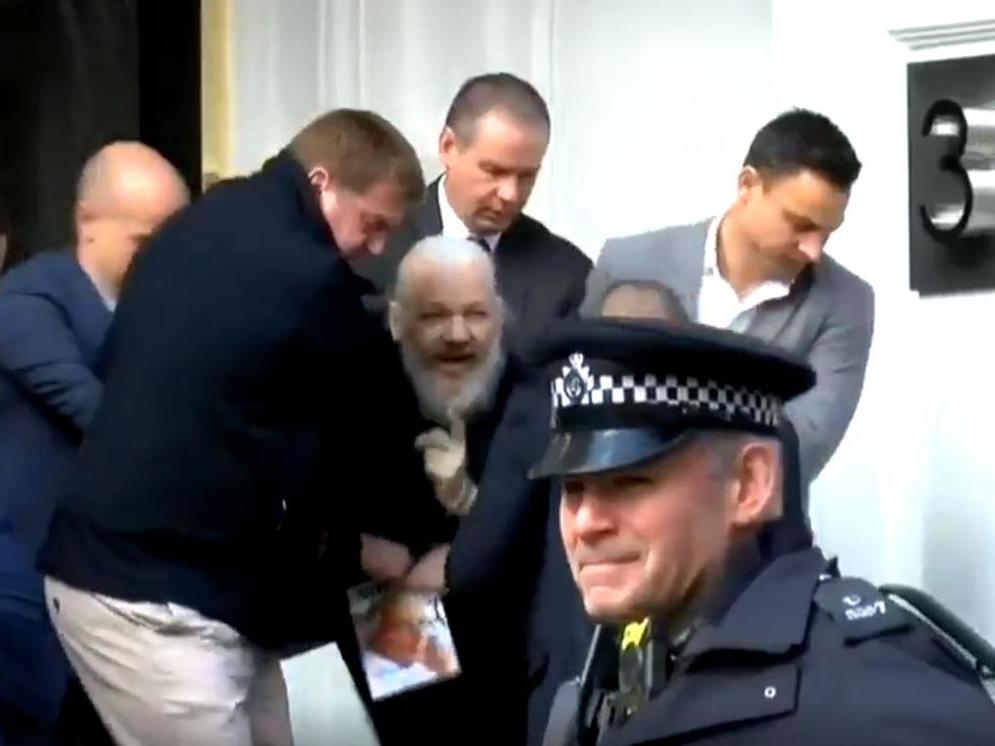Julian Assange: Wikileaks founder arrested by UK police and removed from Ecuador embassy
Ecuadorian government withdraws asylum seven years after 47-year-old took refuge to avoid extradition

Wikileaks founder Julian Assange is facing extradition to the US after being arrested by British police and forcibly removed from the Ecuadorian embassy in London.
Officers executed a warrant for the 47-year-old’s arrest on Thursday morning after the Ecuadorian government withdrew his asylum, blaming his "discourteous and aggressive behaviour".
Mr Assange took refuge in the Knightsbridge embassy seven years ago to avoid extradition to Sweden, where he faced sexual assault allegations.
Those accusations have since been dropped but he remained wanted for failing to surrender to Westminster Magistrates’ Court in June 2012.
After being taken into custody at a central London police station on Thursday morning, he was arrested again behalf of US authorities, who are seeking his extradition over the release of sensitive government files.
The US Department of Justice said Mr Assange had been charged over "an alleged conspiracy with Chelsea Manning "to break a password to a classified US government computer''.
Mr Assange had long maintained he would be extradited to the US if he left the embassy.
The Metropolitan Police said it “had a duty to execute the warrant” and was "invited into the embassy by the Ambassador, following the Ecuadorian government’s withdrawal of asylum”.
Lenin Moreno, the Ecuadorian president, said Mr Assange’s asylum had been revoked ”after his repeated violations to international conventions and daily-life protocols”.
He claimed Mr Assange he had accessed the consulate's security files without permission, "confronted and mistreated guards", and was "involved in interfering in internal affairs of other states".
Wikileaks accused Ecuador of terminating the asylum "in violation of international law”.
"Powerful actors, including CIA, are engaged in a sophisticated effort to dehumanise, delegitimise and imprison" Mr Assange, it added in a tweet.
The Wikileaks founder was led "screaming" and "struggling" from the embassy at about 10.25am, according to a witness. Footage showed him surrounded by officers as he was led from the building and bundled into a waiting van.
Mr Assange was taken into custody at central London police station and will appear before Westminster magistrates "as soon as is possible", Scotland Yard said.
Sajid Javid, the UK home secretary, said the Wikileaks founder was “rightly facing justice in the UK”. He added: “I would like to thank Ecuador for its cooperation and the Met Police for its professionalism. No one is above the law.”
Foreign secretary Jeremy Hunt added: "Julian Assange is no hero. He's hidden from the truth for years and years and it's right that his future should be decided in the British judicial system."
A United Nations human rights expert last week expressed concern about reports that Mr Assange was set to be expelled from the embassy.
“He is likely to be arrested by British authorities and extradited to the United States,” said Nils Merlzer, the UN special rapporteur on torture. “Such a response could expose him to a real risk of serious violations of his human rights, including his freedom of expression, his right to a fair trial and the prohibition of cruel, inhuman or degrading treatment or punishment.”
The UN has previously concluded Mr Assange's refuge in the Ecuadorian embassy amounted to arbitrary detention.
CIA whistleblower Edward Snowden said: "Assange's critics may cheer, but this is a dark moment for press freedom."
Mr Moreno said he had received written assurances from the UK government that Mr Assange would not be "extradited to a country where he could face torture or the death penalty".
Britain typically seeks guarantees that suspects will not be executed before extradition, but last year faced criticism for failing to obtain such assurances for two British Isis militants facing charges in the US.
Former Ecuadorian president Rafael Correa, whose government granted Mr Assange asylum, accused his successor of being "the greatest traitor" for allowing his arrest. He added: "Moreno is a corrupt man, but what he has done is a crime that humanity will never forget."
